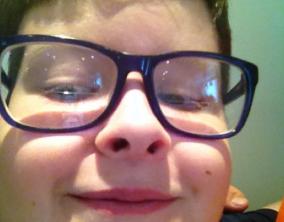Orlando is a 12-year-old boy living with Marinesco-Sjögren syndrome in Brazil
Orlando’s StoryMy name is Meyre. My son, Orlando, is 12 yrs old. Here in Brazil it is very difficult to find rare disease support, especially from doctors, so he has never gotten a formal diagnosis. Some doctors say he has Ataxic Cerebral Palsy with some specific MSS signs. During the first seven years of his life I was tireless in the search for answers. So, we did all genetic tests that we could afford and we also sent his DNA for Sil1 testing but none of them were positive. I am very grateful for the support we receive from outside Brazil and especially for the help in getting the tests that were not available here.  Orlando was born in May 2002 at 6:45 PM. It was a cold day with drizzles. I will never forget that wonderful and blessed day. Nothing went wrong with his gestation and birth (Cesarean delivery). He was so cute! He weighed 3.645 Kg and was49 cm long. I am sure he was the most beautiful baby in that hospital J His apgar was 9 of 10 which was really good! He continued to be in 100th percentile in height and weight his first year. However, his height and weight started slowing after that causing him to have lower and lower metrics for child development. He showed motor delays when he was six months old, the same time that cataracts appeared in both eyes. He required surgery to remove them when he was 10 and 11 months old. After that, when he was 2.5 years old he had another surgery to add lenses – IOLs - and minimize his dependence on glasses. He started walking at 20 months old after a lot of physiotherapy sessions. I talk a lot, so he talks too. J He talks slowly but very well and in this part he was considered above average for child development. He always walked on tiptoe due to spastic gait and had poor balance what made him fall easily and frequently, but he always got up and walked happily. I talked with doctors abroad by email and I got good information from them. We tried to push local doctors to be more proactive but, in fact, all we found out was by ourselves and required personal dedication, observation and study. Orlando continues to have physical therapy and swimming class. He also has speech, occupational therapy, and hippotherapy. Since last year, he has a teacher that helps him at home with literacy. We had two MRI which showed his cerebellum was underdeveloped. He was diagnosed with ataxic CP but with some potential to be MSS. He did some genetic tests to check for ataxic syndromes, CTX (Xantomatose Cerebrotendinosa) and Sil 1 mutation. All the tests results were negative. In 2011 our doctor suggested genetic mapping, but we decided to stop spending money with that and redirect this budget to his future mainly because the tests are too expensive and are unlikely to improve his health. Orlando learns slowly and has much difficulty with written language (Portuguese, English, etc.) and mathematics. He is not literate yet but he can read small words and can copy words too. However, his verbal skills are very good and help him in learning. He learns a lot about history, science and geography if they are taught making him use his imagination. We’ve tried regular and special school. We chose the regular school with constructivist methodology (learning occurs best when the learner is actively involved). It is not easy to define the best school so my experience says: “don’t worry and try available methods to find the best one for your child”. This year Orlando developed secondary glaucoma and lost ~ 70% of his vision in his left eye, but right is perfect! Due to surgery he had to stay at home and ended up losing muscle mass in the legs which worsened his walk and position of feet. In face of that, he needs to use orthosis, a walker and a wheelchair only for long distances. We are still working with physical therapy and electrical stimulation (FES) in order to recover. According to doctors, secondary glaucoma can occur when people had cataracts. I would rate Orlando’s symptoms as low in speech, mild in fine motor and cognitive, and more severe in balance, literacy and walking skills. He loves riding horses, talking with friends, playing Minecraft, and swimming. Most important, he is really happy which shows we are doing a good job! Our biggest concern right now is the position of his foot and literacy difficulty. We currently live in a kind of small farm (since last year) with horse, chicken, dogs, all nature, São Paulo, Jundiaí, Brazil. He is in love with this new place we are living. Latest Marinesco-Sjogren Syndrome Community Activity |









No hay comentarios:
Publicar un comentario